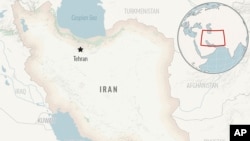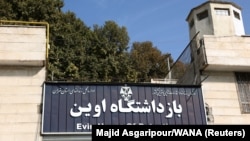
Iran executed at least 975 people last year in a "horrifying escalation" of its use of capital punishment, two human rights groups said on Thursday.
Norway-based Iran Human Rights (IHR) and French group Together Against the Death Penalty (ECPM) said the figure was the highest since IHR began recording executions in Iran in 2008.
The figure "reveals a horrifying escalation in the use of the death penalty by the Islamic republic in 2024," they said in a joint report, accusing Iran of using the death penalty as a "central tool of political oppression."
"These executions are part of the Islamic republic's war against its own people to maintain its grip on power," IHR director Mahmood Amiry-Moghaddam said.
"Five people were executed on average every single day in the last three months of the year as the threat of war between Iran and Israel escalated."
Last year's figure represented a 17% increase on the 834 executions recorded in 2023, the report said.
Of the 975 people executed, four people were hanged in public and 31 were women, also the highest figure for the past 17 years.
Executions over protests
Human rights groups, who say that Iran is the world's most prolific executioner after China, accuse the authorities of using the death penalty to sow fear among the public, particularly after nationwide protests broke out in 2022.
Capital punishment remains a key pillar of the sharia-based judicial system established after the 1979 revolution ousted the Western-backed shah.
Crimes punishable by death include murder, rape and drugs offenses but also more vaguely worded charges like "corruption on earth" and "rebellion" which activists say are used against dissidents.
In recent years, executions have been carried out by hanging, mostly in prison yards but occasionally in public, though other methods remain on the statute books.
Two of last year's executions were in connection with the nationwide protests that erupted in September 2022 after the death in custody of Mahsa Amini, an Iranian-Kurdish woman arrested for an alleged breach of Iran's mandatory dress code.
Mohammad Ghobadlu, 23, was executed in January 2024 on charges of killing a police officer with a car during a protest in October 2022. Human rights groups have charged that his trial was deeply flawed, with judges ignoring evidence presented by the defense that he suffered from bipolar disorder.
Gholamreza Rasaei, 34, was executed in secret in August on charges of killing a Revolutionary Guard during a 2022 protest. Activists said his confession had been obtained by torture.
The rights groups said there was evidence Iran might have carried out more executions last year that they were unable to confirm for their report.
They said there were reports of an additional 39 executions in 2024 that they had been unable to corroborate through second sources.
Already this year, Iran has carried out at least 121 executions, according to IHR's count.







